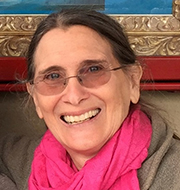 I’ve been reflecting on how my international work and relationships with people globally mirrors what I have made my “extended family”. Immaculée Ilibagiza, who survived the Rwandan genocide in a three- by four-foot hidden room with seven other women for 91 days, and Helen Silberberg (1927-2207), my cousin’s mother-in-law who survived the Holocaust in a Nazi Concentration camp when she was a teenager, gave meaning to each other and all those who were at one of my family gatherings. The four living generations of my “actual” family (as typically defined in our culture) have roots from many nations, cultures and religions. My husband just went from Belfast to Monegal to Ballyferriter reconnecting with his own and President Barack Obama’s Irish heritage. My sons-in-law and daughters-in-law have among them Scottish, Greek, Polish and English roots. My nephew and his wife, respectively son of my Russian Jewish-descent brother and my Christian German-born sister-in-law and daughter of her Finnish mom and British dad, just had a baby in London. My niece recently married the son of an Angolan mom and a Dutch dad. The son of my cousin, whose mother escaped the Holocaust through Czechoslovakia and whose husband is from Italy, recently married in Israel. We just keep getting more international! My extended family goes far beyond that.
I’ve been reflecting on how my international work and relationships with people globally mirrors what I have made my “extended family”. Immaculée Ilibagiza, who survived the Rwandan genocide in a three- by four-foot hidden room with seven other women for 91 days, and Helen Silberberg (1927-2207), my cousin’s mother-in-law who survived the Holocaust in a Nazi Concentration camp when she was a teenager, gave meaning to each other and all those who were at one of my family gatherings. The four living generations of my “actual” family (as typically defined in our culture) have roots from many nations, cultures and religions. My husband just went from Belfast to Monegal to Ballyferriter reconnecting with his own and President Barack Obama’s Irish heritage. My sons-in-law and daughters-in-law have among them Scottish, Greek, Polish and English roots. My nephew and his wife, respectively son of my Russian Jewish-descent brother and my Christian German-born sister-in-law and daughter of her Finnish mom and British dad, just had a baby in London. My niece recently married the son of an Angolan mom and a Dutch dad. The son of my cousin, whose mother escaped the Holocaust through Czechoslovakia and whose husband is from Italy, recently married in Israel. We just keep getting more international! My extended family goes far beyond that.








 Gathering regularly in my home for “family” occasions are those who have become my family through profoundly strong bonds that transcend mere friendship. At our various gatherings on special holidays or for the joys – celebrations of birth, marriage, rites of passage, etc. – as well as the sorrows – providing solace at intensive care units, funerals, etc. – they’ve hailed from Liberia, China, Lebanon, South Africa, the Philippines, India, Uruguay, Malaysia, Armenia, Puerto Rico, Korea, Brazil, Croatia, Colombia and other nations. Or we’ve traveled to be with them. I write for our inter-denominational, inter-generational multi-cultural, multi-racial, multi-national Seder, “Haggadah means ‘the telling’ and we must keep telling this freedom story because if any people are exploited or oppressed anywhere in the world, none of us truly is free. Tonight in this season of hope we focus on the possibilities for peace, justice, truth and reconciliation among all people. Every faith-based tradition honors the prospect of regeneration with sacred ceremony. Although each ritual is a different form of expressing the hope of what the goodness life can offer, all of us are inextricably linked together in profound ways, regardless of our unique traditions.”
Gathering regularly in my home for “family” occasions are those who have become my family through profoundly strong bonds that transcend mere friendship. At our various gatherings on special holidays or for the joys – celebrations of birth, marriage, rites of passage, etc. – as well as the sorrows – providing solace at intensive care units, funerals, etc. – they’ve hailed from Liberia, China, Lebanon, South Africa, the Philippines, India, Uruguay, Malaysia, Armenia, Puerto Rico, Korea, Brazil, Croatia, Colombia and other nations. Or we’ve traveled to be with them. I write for our inter-denominational, inter-generational multi-cultural, multi-racial, multi-national Seder, “Haggadah means ‘the telling’ and we must keep telling this freedom story because if any people are exploited or oppressed anywhere in the world, none of us truly is free. Tonight in this season of hope we focus on the possibilities for peace, justice, truth and reconciliation among all people. Every faith-based tradition honors the prospect of regeneration with sacred ceremony. Although each ritual is a different form of expressing the hope of what the goodness life can offer, all of us are inextricably linked together in profound ways, regardless of our unique traditions.”
In my professional and personal life, I am committed to nourishing the deepest roots and the broadest branches of an extended family tree. How do you build bridges of connection and understanding across the many barriers that divide us?

